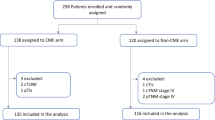Abstract
Background
The use of laparoscopy for colorectal cancer resection is still controversial.
Methods
We prospectively analyzed the outcome of minimally invasive resection for colorectal cancer, performed at our institution from 1998, when laparoscopic surgery became the treatment of choice for colorectal cancer, until 2004. All patients undergoing elective resection were assessed in terms of perioperative results (duration of surgery, number of lymph nodes removed, length of specimen, rate of conversion, complications) and survival. Patients were assessed yearly with follow-up visits and telephone interviews.
Results
In the study period, 302 patients (mean age 66.1 years; range, 32–93 years) underwent 114 left hemicolectomies, 108 low anterior resections, 61 right hemicolectomies, 12 Miles procedures, 4 subtotal colectomies, and 3 transverse colon resections. Surgery took an average of 226 minutes (SD=71 min). The number of lymph nodes removed was 14±8. The conversion rate was 10%; most of the conversions were due to locally advanced cancer (15 cases) and bowel distension (7 cases). Fifteen anastomotic leaks were observed (5%). Twenty patients needed reoperation and two died: one of septic shock due to an anastomotic leak; the other of electrolyte imbalance and dehydration after peritonitis due to a bowel loop injury. Follow-up was available for 91% of patients. Cancer-related survival curves showed a 90% survival for stage II, 85% for stage III, and 10% for stage IV disease, 30 months after surgery.
Conclusions
Minimally invasive laparoscopic resection for colorectal cancer enables an oncologically adequate resection with complication and survival rates that are no worse than are to be expected after traditional open surgery. Locally advanced tumor and bowel distension are the most frequent reasons for conversion to open surgery.
Similar content being viewed by others
Author information
Authors and Affiliations
Corresponding author
Additional information
An erratum to this article is available at http://dx.doi.org/10.1007/s10151-006-0317-7.
Rights and permissions
About this article
Cite this article
D’Annibale, A., Morpurgo, E., Fiscon, V. et al. Minimally invasive resection for colorectal cancer: perioperative and medium-term results in an unselected patient group at a single institution. Tech Coloproctol 10, 303–307 (2006). https://doi.org/10.1007/s10151-006-0297-7
Received:
Accepted:
Published:
Issue Date:
DOI: https://doi.org/10.1007/s10151-006-0297-7




